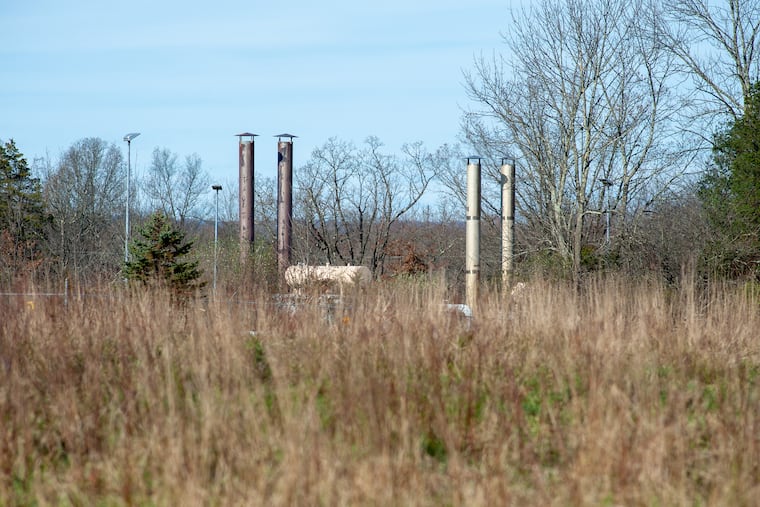As Adelphia pipeline clears hurdles, Bucks officials raise zoning concerns
A county commissioner told federal authorities the project doesn’t comply with county or local ordinances.

For more than a year, residents in West Rockhill Township have been waging a David-vs.-Goliath fight against Adelphia Gateway LLC, a company seeking approval to run high-pressure natural gas literally through their backyards.
And in recent weeks, the dispute has picked up speed, buoyed by preliminary approvals from regulatory agencies even as it meets fresh opposition from elected officials, who say the project ignores key zoning ordinances.
The state Department of Environmental Protection in April approved the air-quality permit for a compressor station that is key to the 84-mile pipeline, records show. That doesn’t give Adelphia Gateway license to put shovels in the dirt, however. There are nearly 10 additional permits that need to be cleared by the agency, according to Virginia Cain, a DEP spokesperson.
But the ruling triggered swift response, both from the people who’ll be staring down the station’s 5,625 horsepower compressors if it’s built, and from officials caught in a jurisdictional limbo with federal authorities.
Officials like Robert Loughery, chairman of Bucks County’s Board of Commissioners.
In a letter sent to the Federal Energy Regulatory Commission on May 7 — and made public by the agency last Tuesday — Loughery wrote that Adelphia Gateway’s plans for the compressor station are not in compliance with township ordinances or the county’s most recent comprehensive plan, adopted in 2011.
“We wrote the letter because these are issues that any other entity would have to abide by,” Loughery said. “They don’t, but we’re telling them as a matter of record that these are our concerns. We can’t tell them what to do, but we’re hoping they note our opinion on them.”
Loughery said a review by the county planning commission found the site to be too small, preventing “adequate buffering of noise or visual impact," and that the plan “impacts environmentally sensitive resources” in the surrounding area, including wetlands.
For months, FERC officials have said — and state agencies agreed — that the project is exempt from following local zoning ordinances because it falls under federal jurisdiction.
Adelphia Gateway spokesperson Katelyn Howard said the company has “collaborated with communities and landowners” along the pipeline route and incorporated their feedback “where possible.”
The company, she added, is “committed to minimizing the impact on the environment and the community,” and will work to ensure the pipeline meets all applicable regulations.
As county officials trade correspondence with FERC, residents in West Rockhill are taking their own measures.
Tom Cuce and Rose Merrigan, who live about 500 feet from the proposed location of the compressor station, filed an appeal of the DEP’s permit approval on Wednesday. They were joined in a similar appeal by West Rockhill Township.
Merrigan, speaking from her home Monday morning, said the decision to enter a legal fray with the state came with some soul-searching. But, ultimately, she and her partner felt they had no other choice.
“The way we looked at it, we had spent 15 months of our lives dedicated to having this gas company do the right thing for our community,” Merrigan said. “And if we didn’t do it, it’s going to look like we weren’t serious about any of our complaints this past year.”
During those 15 months, other elected officials helped raise their issue. U.S. Rep. Brian Fitzpatrick and State Rep. Craig Staats penned a letter to FERC Chairman Neil Chatterjee in December, pleading with him to find an alternative location for the compressor station.
The station’s proposed location was “unacceptable,” the two wrote, and would negatively impact the property values of surrounding homes. The letter had little effect.
In fact, FERC issued an environmental assessment less than a month later ruling that the proposed location was “optimal.” The assessment, an incremental step in the review of the pipeline, said that, with appropriate measures, the station "would not constitute a major federal action significantly affecting the quality of the human environment.”